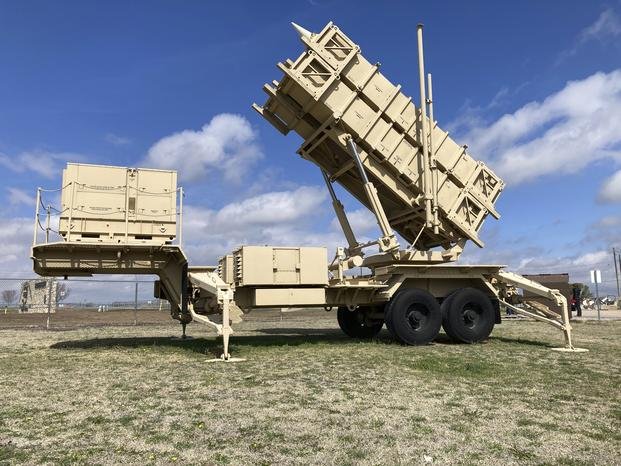The military lockdown on information about U.S. training of Ukrainian troops has been near absolute, with reporters blocked from access to American service members' work in Poland and even training efforts in the United States.
But on Tuesday, March 21, reporters were allowed to watch Ukrainian students set up and initialize an entire Patriot missile battery at Fort Sill, Oklahoma, part of a training program that was announced in January.
Army officials allowed no photos and no interviews with the Ukrainians. On this day, reporters were permitted only to interview U.S. Army officials and, except for only a few high-ranking officers, were required to list trainers as "senior officers" and "senior military trainers."
Read Next: Here Are the Air Force's New Uniform Rules
The Army held the event on a windswept, rainy plain as a detachment of these Ukrainian missile defense trainees established a perimeter, wheeled in an AN/MPQ-53 radar, a command Engagement Control Station (ECS), a generator, and several boxy M901 and M903 missile launchers. In 45 minutes, they established a protective area of a little more a half-mile radius surrounding the site.
It was good set-up time, said a senior military trainer. "Doctrinally speaking, this should take longer, but ..." he snapped his finger for emphasis, "...they are on it."
It was their knowledge and background with the older Russian-made S-300 missile defense system that helped them use the American system, but there was an added edge, said one senior military official.
"I will tell you that there is a sense of realism that makes a sense of urgency," said another senior officer. "Not to say we don't have that all the time, but it's increased. You know that when they go in, they are under threat."
The sense of urgency fed both the trainees and their instructors. The effort started when 65 Ukrainian trainees arrived on Jan. 15, and training began two days later. Just a few days in and it became clear that, although most of the trainees spoke some English, the highly technical language of radars, missiles and doctrine meant that the two interpreters assigned would not be enough. A call was put out throughout the U.S. Army to bring Ukrainian and Russian speakers into the effort, and 18 very motivated language specialists showed up. It upped the tempo of the training.
"We were able to increase, increase, and increase the level of knowledge on the training, based on their capability, but also their desire, motivated by that existential threat they are facing. Our soldiers understand that as well," the senior official said.
The Ukrainians are combat tested on the S-300 system, a capable air defense weapon developed by the former Soviet Union and fielded by numerous Eastern Bloc countries. The trainees already understand basic and overlapping coverage and layers, and how to counter Russian cruise missiles, Unmanned Air Systems (or drones), and ballistic missiles. They had the S-300 system. They understand radar theory. They understand the physics involved in an engagement.
For that reason, the Army was able to train the Ukrainians on more advanced scenarios, ones that normally require a 30-week study time, the senior official said. But the Ukrainians got it all in 10 weeks.
The trainees were restricted to Fort Sill, like all foreign forces at the base, but were given complete access to amenities such as the bowling alley, the Shoppette, the PX and other on-base entertainment. The trainees also met regularly for off-time cookouts with their American trainers, engaging in cultural exchanges. During one, the trainees decided to give their trainers a taste of real Ukrainian borscht, a national soup made of beets. It's an acquired taste, said one senior trainer.
"They were asking for soup every day, so we made that happen," he said.
The Americans in turn treated the Ukrainians to key American traditions tied to meat over flame, which they took a liking to, he said.
"They were super into hamburgers and steaks. I guess a lot of them don't eat steaks like we do," he said.
These team-building exercises were important, he said, because they needed to build unit cohesion. While the Ukrainians were all from the same country, they were not from the same units and needed to develop that layer of trust with one another as well as the trainers.
The weight of what the Ukrainians are fighting for back in their home country was underscored as the anniversary of the start of the war, Feb. 24, 2022, passed during their stay at Fort Sill. The trainers and trainees gathered for an observance dinner.
They watched Ukrainian President Volodymyr Zelenskyy deliver his speech on the anniversary. He made statements about the Patriot system and the other military aid being given to Ukraine by the U.S.
The emotional moment connected with the trainees; many were in tears when Zelenskyy said at one point that everyone in the country has a contact in their cell phone they can no longer call. One woman, a trainee whose husband died in the bombing, was hit especially hard.
"They were saddened," the senior trainer said. "It broke the whole room. … They all have lost someone -- mothers, grandmas. Whole towns have been destroyed. Colleges have been destroyed."
With their graduation date approaching quickly -- the actual date is classified, the trainers said -- most expressed concern about their students, but also admiration for their knowledge and innate abilities.
"It's tough to watch them go forward," said Col. Martin O'Donnell, a spokesman for U.S. Army Europe and Africa, who worked often with Ukrainians through his position. "It's hard to be in the passenger seat. I deal with Ukrainians almost daily. … They've got a tough break, the Ukrainians."













